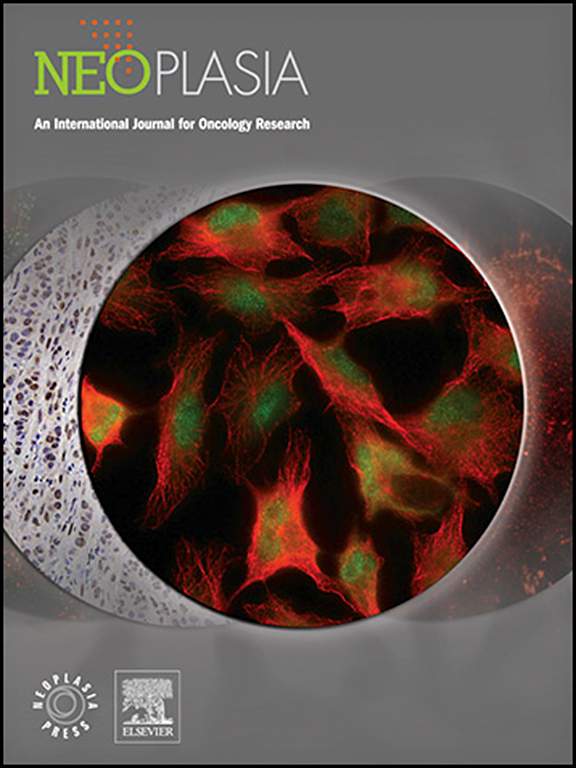IGSF9 promotes tumor invasion and metastasis through GSK-3β/β-catenin mediated EMT in lung cancer
IF 4.8
2区 医学
Q1 Biochemistry, Genetics and Molecular Biology
引用次数: 0
Abstract
We previously reported that immunoglobulin superfamily member 9 (IGSF9) as a tumor specific immune checkpoint promoted the tumor immune escape, however, as an adhesion molecule, whether IGSF9 promotes tumor invasion and metastasis has not been reported. Here, the full length, the intracellular domain (ID) not extracellular domain (ECD) of IGSF9 could alter tumor cell morphology from a flat and polygonal shape to elongated strips, suggesting that IGSF9 signal pathway has the potential to mediate epithelial-to-mesenchymal transition (EMT). Real-time PCR and western blotting also showed that the mesenchymal markers were significantly up-regulated, and the epithelial markers were significantly down-regulated in IGSF9 and IGSF9-ID groups. Meanwhile, immunofluorescence showed that β-catenin was clearly translocated into the nucleus in IGSF9 and IGSF9-ID groups. The in vitro and in vivo data showed that IGSF9, IGSF9-ID and ECD could promote tumor invasion and metastasis. Mechanistically, IGSF9-ID could recruit GSK-3β to result in the accumulation and nuclear translocation of β-catenin to trigger EMT. Anti-IGSF9 could significantly inhibit the invasion and metastasis, and IGSF9 is an effective candidate for lung cancer therapy.
IGSF9通过GSK-3β/β-catenin介导的肺癌EMT促进肿瘤侵袭和转移。
我们曾报道免疫球蛋白超家族成员9(IGSF9)作为一种肿瘤特异性免疫检查点促进了肿瘤免疫逃逸,但作为一种粘附分子,IGSF9是否会促进肿瘤的侵袭和转移尚未见报道。本文研究发现,IGSF9的全长、胞内结构域(ID)而非胞外结构域(ECD)可以改变肿瘤细胞形态,使其从扁平的多角形变为拉长的条状,这表明IGSF9信号通路具有介导上皮细胞向间质转化(EMT)的潜力。实时荧光定量PCR和Western印迹也显示,IGSF9组和IGSF9-ID组间充质标志物显著上调,上皮标志物显著下调。同时,免疫荧光显示,β-catenin在IGSF9组和IGSF9-ID组明显转位到细胞核中。体外和体内数据表明,IGSF9、IGSF9-ID和ECD均能促进肿瘤的侵袭和转移。从机理上讲,IGSF9-ID可以招募GSK-3β,导致β-catenin的聚集和核转位,从而引发EMT。抗IGSF9能显著抑制侵袭和转移,IGSF9是肺癌治疗的有效候选药物。
本文章由计算机程序翻译,如有差异,请以英文原文为准。
求助全文
约1分钟内获得全文
求助全文
来源期刊

Neoplasia
医学-肿瘤学
CiteScore
9.20
自引率
2.10%
发文量
82
审稿时长
26 days
期刊介绍:
Neoplasia publishes the results of novel investigations in all areas of oncology research. The title Neoplasia was chosen to convey the journal’s breadth, which encompasses the traditional disciplines of cancer research as well as emerging fields and interdisciplinary investigations. Neoplasia is interested in studies describing new molecular and genetic findings relating to the neoplastic phenotype and in laboratory and clinical studies demonstrating creative applications of advances in the basic sciences to risk assessment, prognostic indications, detection, diagnosis, and treatment. In addition to regular Research Reports, Neoplasia also publishes Reviews and Meeting Reports. Neoplasia is committed to ensuring a thorough, fair, and rapid review and publication schedule to further its mission of serving both the scientific and clinical communities by disseminating important data and ideas in cancer research.
 求助内容:
求助内容: 应助结果提醒方式:
应助结果提醒方式:


